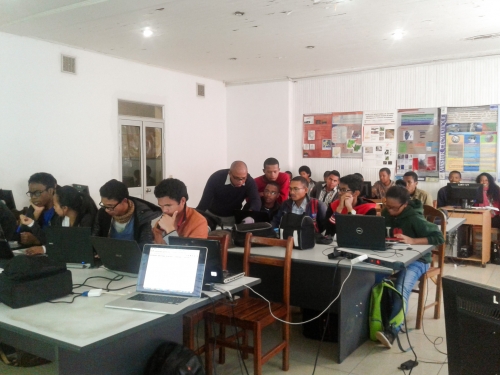Closing the skills gap for young researchers through innovation and entrepreneurship training


Image: Riccardo Annandale: Unsplash
Innovative thinking and knowledge of open science are assets for any research career but as only approximately 10% of astronomy doctoral graduates remain in academia, the skills graduate students are equipped with need to be effectively transferable to the workforce to avoid a skills gap.
The SKilled, Innovative and Entrepreneurial Scientists (SKIES) project aims to provide PhD candidates and young doctoral researchers in the field of astronomy with a new set of skills integrating open science, social innovation and entrepreneurship topics. SKIES will be implemented in astronomy research organisations in Germany, the Netherlands, Poland, Portugal and South Africa (SA), reaching 500 astronomy graduate students and young researchers. Researchers from the University of Cape Town (UCT) will be leading the project in SA which is extended to PhD candidates from organisations across the country.
Dr Lucia Marchetti, from the UCT department of astronomy and principal investigator for SKIES in SA shared: “I am thrilled to be able to offer this opportunity to our PhD candidates. Their astronomy training already provides them many theoretical skills they can apply into a job outside academia, like programming and problem solving. With this training we will now show them how they can best exploit and translate their knowledge into a job beyond astronomy. In this way we will ensure that all our astronomy students are fully equipped for whichever path they decide to take after their PhD.”
The SKIES training will consist of three modules co-created by academic and industry partners: one on open science and responsible research and innovation; one on open innovation and entrepreneurship; and a career-oriented masterclass including mentoring. To support the project partners and other organisations interested in running similar courses, online training will be made available in the form of a mini online open course that will remain available after the project has ended to ensure its impact and legacy.

Madagascar Astronomy Python Workshop 2017. Credit: IAU Office of Astronomy for Development archive
"While an advanced degree in STEM (Science Technology Engineering and Mathematics) subjects has long been an excellent basis for a career in, for example, the tech industry, most graduates still have to pick up additional skills along the way. The SKIES project aims to bridge this gap by enabling astronomy PhD candidates to build upon their strengths to develop into well-rounded scientists and professionals. This is particularly important for SA in the increasingly global talent search of the 4IR era,” shared University of the Western Cape eResearch Director and Astroinformatics Research Professor Mattia Vaccari.
With this new skills training, young researchers will be gaining substantial experience equipping them for a career to fulfil their potential within and beyond academia and to contribute to the economy and societal challenges. A Train-the-Trainer programme will build the capacity of the teaching staff in each partner country so that they have the knowledge and tools to continue the programme beyond the lifetime of the project.
Astronomy is an open, collaborative and international research field, training students in diverse skills ranging from theoretical approaches and big-data science to observations and laboratory work. This presents a unique opportunity to build on the existing programme and integrate a modern skills course.
Dr Bonita de Swardt, Programme Manager: Strategic Partnerships for Human Capital Development at the South African Radio Astronomy Observatory (SARAO) shared: "SARAO supports this exciting collaboration, which gives doctoral candidates the necessary skills for a smoother transition from academia to industry. It is expected that the SKIES project will lead to increased employability of doctoral candidates, in industry or through entrepreneurship, who will be effectively working on high-impact areas to benefit broader society on the African continent. We look forward to implementing this training and development opportunity with our South African and European partners”.
About SKIES
The EU-funded project SKIES is a project of the International Astronomical Union’s European Regional Office of Astronomy for Development (IAU E-ROAD|) that aspires to contribute to sustainable development and the United Nations Sustainable Development Goals (UN SDGs) through astronomy with a special focus on education and capacity building. The skills training of SKIES falls under the strategic goals regarding capacity building, by training a generation of astronomers that will conduct responsible and open research and is able to employ their skills for societal and economical benefit in non-academic settings.
The IAU E-ROAD based at Leiden University, in cooperation with the Erasmus Centre for Entrepreneurship, Stichting dotSPACE and UCT, as well as four other astronomy higher education institutes, will develop the training modules. The project kicked off on the 1st of March 2021 and will run for 18 months.
Additional information
The SKIES project is funded under the H2020 Science with and for Society programme, Topic 8 ‘Research innovation needs & skills training in PhD programmes’ of the European Commission. Projects under this call aim to contribute to the New Skills Agenda and prepare PhD students for both a research career and for career paths in the public and private sectors.
The IAU E-ROAD is one of 11 regional offices coordinated by the headquarters in Cape Town. It is a partnership between the European Astronomical Society and Leiden University. The office aims to use astronomy as a tool for socio-economic development in Europe and globally, specifically by contributing UN SDGs.
